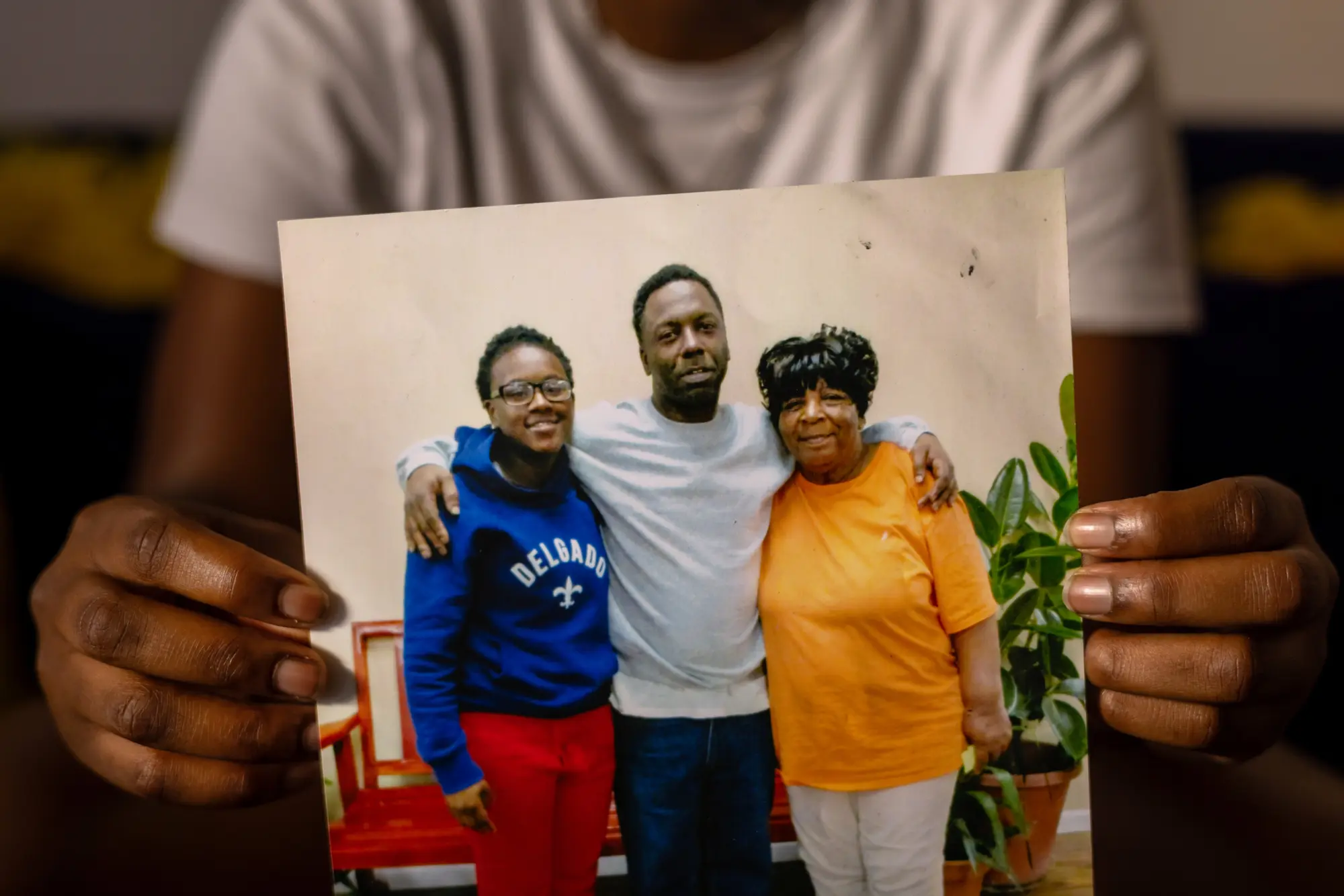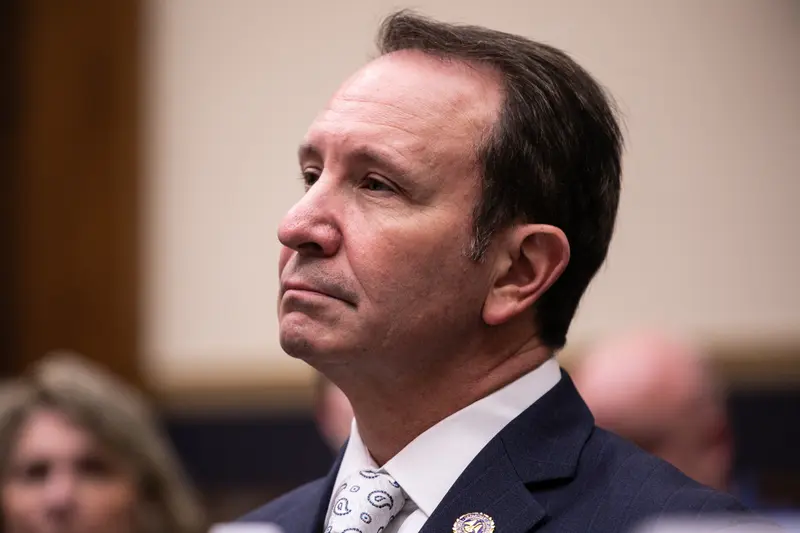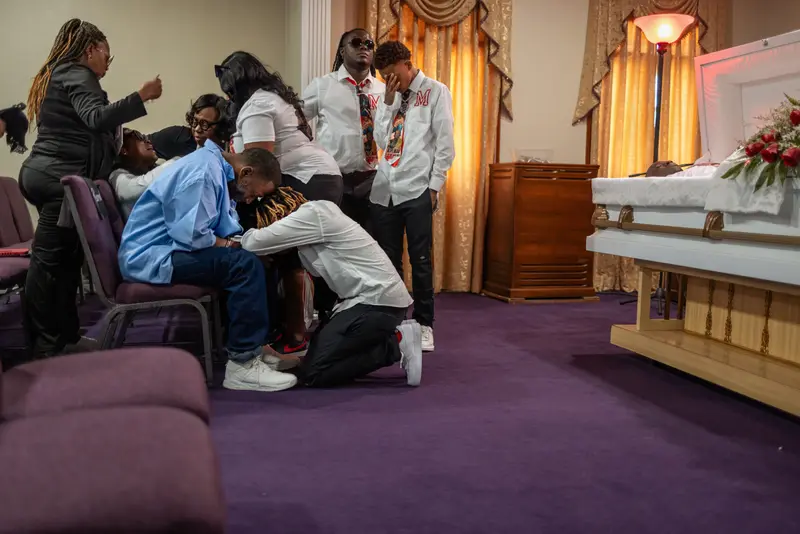
Louisiana Supreme Court Ruling Overturns Reform Law Intended to Fix “Three-Strikes” Sentences
The ruling was a victory for state attorney general, Jeff Landry, but defense attorneys say it could also help their clients’ requests for reduced sentences.
Louisiana Supreme Court Ruling Overturns Reform Law Intended to Fix “Three-Strikes” Sentences
The ruling was a victory for state attorney general, Jeff Landry, but defense attorneys say it could also help their clients’ requests for reduced sentences.

Markesha Lanieux holds a photo of herself, her grandmother Mary Lanieux, and her father, Markus Lanieux, during a visit the women made to see him in prison. A new reform law had created an opportunity for Lanieux’s lawyer to negotiate a reduction in his sentence of life without parole; the Louisiana Supreme Court struck down that law in September. Credit:Kathleen Flynn, special to ProPublic and Verite News
by Richard A. Webster, Verite News
Oct. 4, 6 a.m. EDT
REPUBLISH
Co-published with Verite News
Series:Unwatched: A Louisiana Law Department That Polices Itself
The sheriff of Louisiana’s Jefferson Parish answers only to voters. In this conservative suburb, that translates to nearly unchecked power.
This article was produced for Verite News by Richard A. Webster, who covered Jefferson Parish as part of ProPublica’s Local Reporting Network in 2021-22. Sign up for Dispatches to get stories like this one as soon as they are published.
In September, the Louisiana Supreme Court issued a ruling that appeared to be a major blow to criminal justice reformers seeking to shrink the state’s bloated prison population.
The 4-3 ruling struck down a law that empowered prosecutors to revisit and reduce excessive sentences through post-conviction plea agreements with defense attorneys. The law, which passed the state Legislature unanimously in 2021 and had the backing of the Louisiana District Attorneys Association, was meant to create a formal process to release prisoners serving decadeslong sentences, in many cases for relatively minor crimes, handed down under the state’s habitual offender, or “three strikes,” law.
Verite News and ProPublica recently featured the story of Markus Lanieux, who might have been helped by that law. Lanieux was convicted in 2009 of aggravated flight from an officer, a crime that typically carried a two-year sentence. But two previous drug felonies allowed the Jefferson Parish district attorney to try Lanieux as a habitual offender, which resulted in a sentence of life without parole. If Lanieux had been originally convicted under current habitual offender sentencing laws, the most he could have gotten was four years.
The Supreme Court’s ruling came as the result of a legal challenge filed last year by Louisiana’s conservative attorney general, Jeff Landry, who claimed the law encroached on and usurped the exclusive power of the governor to grant clemency or pardons. Landry intervened in the case of William Lee, whose life sentence had been reduced using the now-overturned law.
His legal challenge was seen as part of a growing backlash across the country against prosecutors who have pushed to end mass incarceration, and it caused many district attorneys in Louisiana to temporarily drop negotiations to reduce excessive sentences while the case was pending.
Immediately after the court announced its decision, Landry, who is running for governor on a tough-on-crime platform, hailed it as a victory for public safety.
“This unconstitutional legislation resulted in some rapists and murderers receiving ‘get out of jail free’ cards,” Landry said. “That recklessness ends now.”

Louisiana Attorney General Jeff Landry Credit:Valerie Plesch/Bloomberg via Getty Images
In a dissenting opinion, state Supreme Court Chief Justice John Weimer criticized Landry’s challenge and warned that the majority’s decision could “have the disastrous effect of undermining, and further limiting, the post-conviction relief procedure that has operated to correct the evils of the past.”
“The post-conviction legislation at issue here was unanimously enacted by the legislature, the people’s representatives, and signed into law by the governor,” Weimer wrote. “Its obvious purpose is to insure justice is done and to act as a counter balance or check on the renegade practices and prejudices of the past.”
News of the ruling quickly spread throughout the state’s prisons, said attorney Nick Trenticosta, who argued on behalf of the law before the Supreme Court and visited several inmates at the Elayn Hunt Correctional Center in St. Gabriel the following week.
“It’s on every prisoner’s mind,” he said. “My clients are now in distress.”
“It’s Not Fine, but It Will Be OK”
Trenticosta, however, was in the prison to tell them not to worry, that far from dealing a death blow to post-conviction resentencing efforts, the attorney general might have inadvertently given them new life.In their decision, the justices said the new law was unconstitutional because it didn’t require prosecutors or judges to identify a specific legal problem with a prisoner’s sentence before granting relief. The ability to adjust a sentence without a specific legal basis, they said, amounted to an “act of grace,” like a pardon, which is considered the domain of the governor.
If the decision had stopped there, it could have been extremely damaging, Trenticosta said. But the justices went on to uphold the “absolute discretion” of prosecutors to provide such post-conviction relief, emphasizing it was the duty of prosecutors to “see that no innocent man suffers.”
According to Trenticosta, the decision affirmed, for the first time explicitly, the right of prosecutors and defense attorneys to cooperatively reach post-conviction deals. Three other defense attorneys with extensive experience in post-conviction deals generally agreed with Trenticosta’s analysis of the ruling’s language, though one of them was concerned about its real-world consequences.
Before the passage of the 2021 reform law, it was common practice for defense attorneys and prosecutors to meet informally to discuss the reduction of someone’s sentence. If both sides came to an agreement, they would take the plea deal to a judge to authorize, which avoided costly and timely litigation. There wasn’t, however, a court- or Legislature-approved structure to this process, which caused concern among some judges, Colin Reingold with a New Orleans-based criminal justice reform group called the Promise of Justice Initiative and three other defense attorneys told Verite News.



 Only criminals need to be worried about this.
Only criminals need to be worried about this. 

